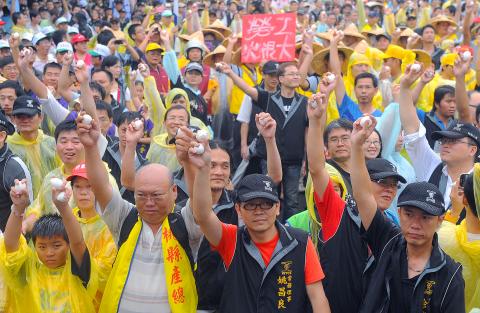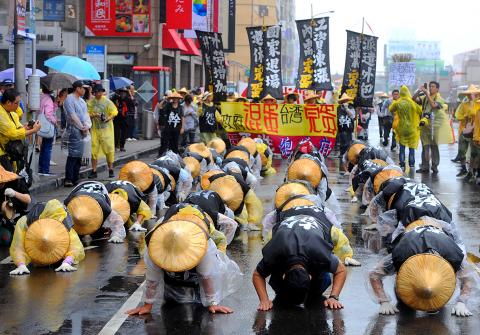Close to 2,000 workers and labor rights advocates yesterday bombarded Ketaglan Boulevard in front of the Presidential Office with eggs while tussling with police as they protested against low wages, unfair labor policies, rising prices and a growing labor insurance deficit.
Despite attempts from the police to calm the crowd, the angry workers — mobilized by various labor organizations, including the Labor Party, Taiwan International Workers’ Association (TIWA), Raged Citizens Act Now and unions from across the country — threw eggs in the direction of the Presidential Office, though they were kept 300m away from the building itself by a line of police.
“Down with the government! Taiwan is finished!” they chanted as they threw eggs across the police line.

Photo Wang Min-wei, Taipei Times
Failing to stop the crowd, hundreds of police officers in riot gear could do nothing but stand behind two large nets and hold their shields high to prevent eggs from hitting them.
Occasionally, officers would advance from behind the police line, trying to arrest protesters who threw more dangerous items, such as smoke bombs, but they were quickly surrounded by the crowd, trying to rescue their fellow protesters, sparking clashes between the two sides.
The demonstration was held in response to several developments affecting labor rights, including the Cabinet’s decision to only partially agree to the Council of Labor Affairs’ proposal to raise the legal minimum wage, the Cabinet’s plan to relax restrictions on hiring foreign laborers and its mulling having separate minimum wages for domestic and foreign workers.

Photo Wang Min-wei, Taipei Times
It also follows the news that the labor insurance system could go broke within two decades and that the government was considering increasing premiums for those who are working, but cutting payments to retired workers.
“President Ma Ying-jeou [馬英九] said that he would work to revive the economy, but when we look at the policies that the government came up with, it’s not hard to realize that they are not working to revive the economy for all, they only work for the benefit of the few,” Taipei City Confederation of Trade Unions secretary-general Chiang Wan-chin (蔣萬金) told the crowd. “They are working for the benefit of big corporations and the wealthy.”
Chiang said that one of the measures that the government was mulling was the relaxation of restrictions on the number of foreign workers that a business may hire.
“This is going to help the big corporations because they can cut costs by hiring more foreign workers and laying off domestic workers,” he said.
TIWA secretary-general Chen Hsiu-lien (陳秀蓮) criticized the government’s proposal to have separate minimum wages for foreign workers and domestic workers.
“If an employer could hire a foreign worker for NT$15,000 a month, why would he or she hire a domestic worker for NT$35,000?” Chen asked.
Chen said that decades ago, big businesses threatened to move their production units overseas unless the government agreed to allow them to import foreign workers, but despite being allowed to hire foreign workers, they still moved their production overseas anyway.
“They are playing the same game again now, we should not be deceived again,” she said.

Taiwan is projected to lose a working-age population of about 6.67 million people in two waves of retirement in the coming years, as the nation confronts accelerating demographic decline and a shortage of younger workers to take their place, the Ministry of the Interior said. Taiwan experienced its largest baby boom between 1958 and 1966, when the population grew by 3.78 million, followed by a second surge of 2.89 million between 1976 and 1982, ministry data showed. In 2023, the first of those baby boom generations — those born in the late 1950s and early 1960s — began to enter retirement, triggering

ECONOMIC BOOST: Should the more than 23 million people eligible for the NT$10,000 handouts spend them the same way as in 2023, GDP could rise 0.5 percent, an official said Universal cash handouts of NT$10,000 (US$330) are to be disbursed late next month at the earliest — including to permanent residents and foreign residents married to Taiwanese — pending legislative approval, the Ministry of Finance said yesterday. The Executive Yuan yesterday approved the Special Act for Strengthening Economic, Social and National Security Resilience in Response to International Circumstances (因應國際情勢強化經濟社會及民生國安韌性特別條例). The NT$550 billion special budget includes NT$236 billion for the cash handouts, plus an additional NT$20 billion set aside as reserve funds, expected to be used to support industries. Handouts might begin one month after the bill is promulgated and would be completed within

The National Development Council (NDC) yesterday unveiled details of new regulations that ease restrictions on foreigners working or living in Taiwan, as part of a bid to attract skilled workers from abroad. The regulations, which could go into effect in the first quarter of next year, stem from amendments to the Act for the Recruitment and Employment of Foreign Professionals (外國專業人才延攬及僱用法) passed by lawmakers on Aug. 29. Students categorized as “overseas compatriots” would be allowed to stay and work in Taiwan in the two years after their graduation without obtaining additional permits, doing away with the evaluation process that is currently required,

IMPORTANT BACKER: China seeks to expel US influence from the Indo-Pacific region and supplant Washington as the global leader, MAC Minister Chiu Chui-cheng said China is preparing for war to seize Taiwan, Mainland Affairs Council (MAC) Minister Chiu Chui-cheng (邱垂正) said in Washington on Friday, warning that Taiwan’s fall would trigger a regional “domino effect” endangering US security. In a speech titled “Maintaining the Peaceful and Stable Status Quo Across the Taiwan Strait is in Line with the Shared Interests of Taiwan and the United States,” Chiu said Taiwan’s strategic importance is “closely tied” to US interests. Geopolitically, Taiwan sits in a “core position” in the first island chain — an arc stretching from Japan, through Taiwan and the Philippines, to Borneo, which is shared by